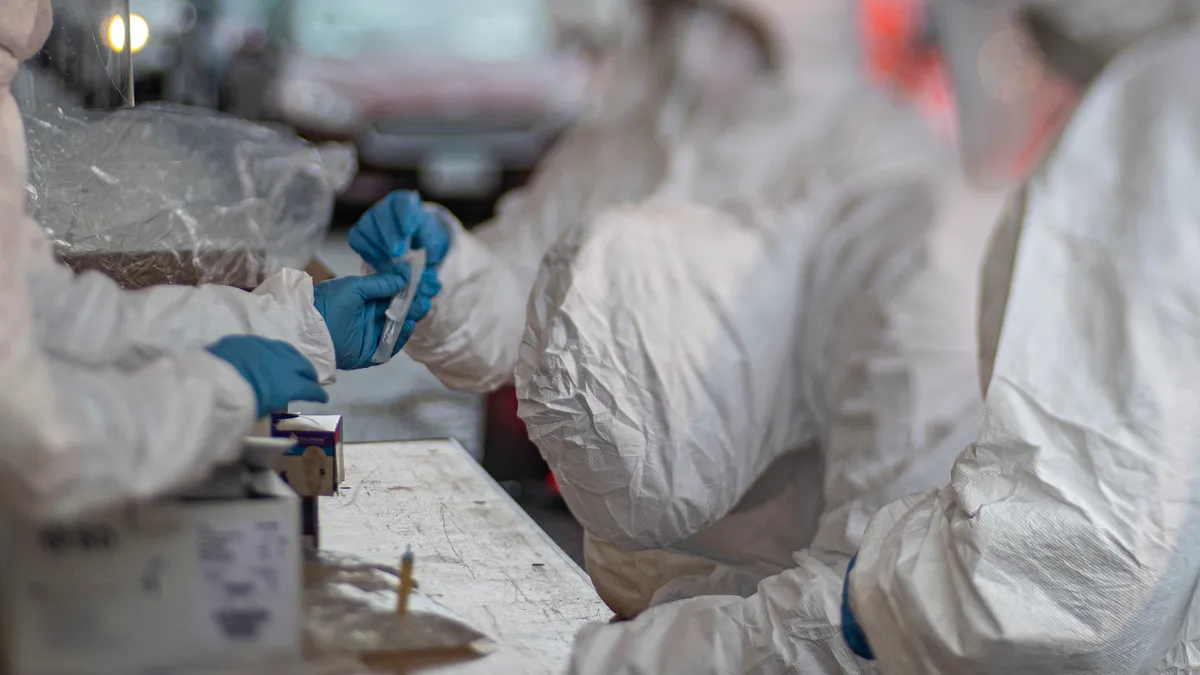Dive Brief:
- BD on Monday announced FDA granted its rapid, point-of-care coronavirus antigen test emergency use authorization, making it only the second such diagnostic to receive a nod from the regulatory agency.
- Quidel’s product, SARS Antigen FIA, claimed the antigen category's first EUA in May and delivers results in 15 minutes. BD's SARS-CoV-2 antigen test, which runs on the company's widely used Veritor Plus System, also delivers results in 15 minutes.
- Unlike polymerase chain reaction (PCR) tests, which detect viral genetic material, antigen-based diagnostics are designed to determine if a sample contains proteins found on the surface of the coronavirus, enabling them to deliver results in minutes rather than days. Although some molecular tests, such as Abbott's ID Now, offer a quick turnaround, antigen tests are believed to be better suited for rapid results.
Dive Insight:
When it comes to testing for active coronavirus infection, PCR tests have dominated the FDA's emergency use authorization activities over the past few months. As of July 2, the agency had granted EUAs to 136 molecular tests, 25 antibody tests, and just one antigen test. BD's antigen-based diagnostic is the second of such tests to get the green light.
The third COVID-19-related test to receive an EUA from FDA, BD plans to start shipping the antigen test product this week and expects to ramp up manufacturing capacity to 2 million tests per week by the end of September. The company added in its announcement it anticipates producing up to 10 million tests from July through September.
The test runs on BD's Veritor instruments, described by the company as being slightly larger than a cell phone, which are currently in use at more than 25,000 hospitals, clinician offices, urgent care centers and retail pharmacies across the country.
The test will enable frontline healthcare workers and people seeking care "to access a quick diagnostic test for COVID-19, offering results in real-time at convenient locations like retail pharmacies, urgent care centers and doctors' offices," said Dave Hickey, BD's president of integrated diagnostic solutions, in a written statement.
While both molecular and antigen tests can be used to diagnose an active coronavirus infection, there are important differences between the two kinds of diagnostics, according to a comparison put out by the FDA last month outlining different types of COVID-19 testing.
The agency notes that although molecular tests are typically highly accurate and usually do not need to be repeated, negative results from antigen tests may need to be confirmed with a molecular test. In particular, FDA contends that antigen tests are not able to definitively rule out active coronavirus infection.
"Antigen tests are more likely to miss an active coronavirus infection compared to molecular tests. Your healthcare provider may order a molecular test if your antigen test shows a negative result but you have symptoms of COVID-19," according to the FDA.
In BD's announcement on Monday, the company acknowledged "FDA recommends that negative test results be confirmed by a molecular method to confirm the result."
Nonetheless, BD said clinical studies performed at more than 20 U.S. sites showed that the test is capable of achieving 84% sensitivity and 100% specificity, which the company claims is comparable to the performance from similar immunoassay tests for Flu A/B, RSV and Strep A performed on its Veritor Plus System.
By comparison, Quidel's assay reportedly demonstrated 80% sensitivity versus an EUA molecular test and 100% specificity in a 143-specimen study using frozen swabs. A second 126-specimen study using fresh samples found 87.5% sensitivity and 100% specificity.
SVB Leerink analysts estimated BD's antigen test could provide up to $300 million in incremental quarterly revenue for the company, per a note to investors Monday. Analysts at William Blair said in a note Monday there's plenty of room for both Quidel, "the clear market leader for broad antigen testing," and BD to succeed in the space.
"We believe demand for antigen testing is building very quickly, especially in settings outside of the typical healthcare arenas used to doing rapid testing," the William Blair analysts wrote. "Based on growing demand across a wide swath of potential end-markets, we see both companies being able to sell whatever they make for the time being."












